

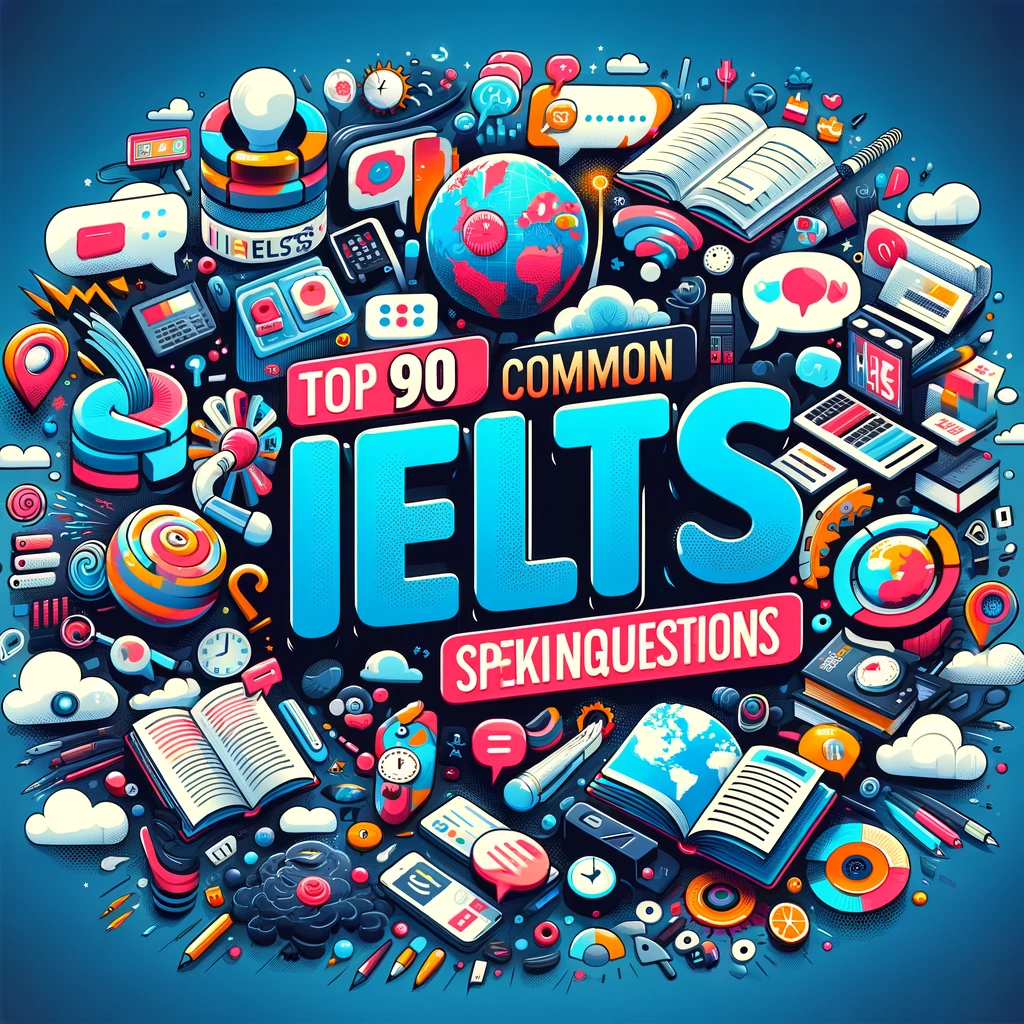
Top 90 Common Questions in IELTS speaking (audio included) (Thay Anh IELTS)
Question 1: What’s your name?
Sample Band 6.5 Answer:
My name is Linh. It’s a name that’s quite common in my country, and it holds significant meaning for me. In our language, Linh signifies a spirit or a soul, and it’s often associated with someone who is capable of great understanding and intuition. While I believe that we forge our own identities, I like to think that my name serves as a gentle reminder to strive for depth and insight in my interactions with the world.
Question 2: Does your name have any special meaning?
Sample Band 6.5 Answer:
My name, though common, holds a special place in my heart as it was chosen by my grandfather. He was a historian and had a fondness for traditional values, so he selected a name that reflected strength and resilience. He believed that a name can subtly influence a person’s path in life. Whether that’s true or not, I’ve always tried to live up to the virtues my name stands for, and this has become a part of my identity.
Question 3: Where do you come from?
Sample Band 6.5 Answer:
I hail from a small coastal town that is known for its vibrant fishing community and stunning seaside landscapes. It’s a peaceful place where everyone knows each other, and there’s a strong sense of belonging and shared history among the residents.
Question 4: What kind of landscape surrounds your hometown?
Sample Band 6.5 Answer:
The landscape around my hometown is quite diverse. We have the ocean on one side, providing breathtaking views of the sunrise over the water. Inland, there’s a mixture of rolling hills and flat farmlands, with several rivers that cut through the terrain, creating lush valleys that are especially green in the spring.
Question 5: What is the main crop in your hometown?
Sample Band 6.5 Answer:
The main crop cultivated in my hometown is rice. There are vast paddy fields that turn a brilliant shade of green during the growing season. The rice harvesting period is a significant time of year for us, and it brings the community together in a celebration of our agricultural heritage.
Question 6: What is the difference between Hanoi and your hometown?
Sample Band 6.5 Answer:
The contrast between Hanoi and my hometown is quite pronounced. Hanoi, as the capital city, is a hub of political and cultural activity with a rich history that’s reflected in its architecture and museums. It’s lively, with the hustle and bustle of urban life and streets lined with vendors and motorbikes. In contrast, my hometown is a serene place where life revolves around nature and the sea. It’s quieter and moves at a gentler pace, where the sounds of the city are replaced by the rhythm of the waves and the chatter of the local wildlife.
Question 7: What are the main places of interest in your hometown?
Sample Band 6.5 Answer:
In my hometown, which is a serene coastal town, the main attractions reflect our rich history and natural beauty. One of the most visited spots is the ancient lighthouse that has been guiding ships safely for centuries. Its history intertwines with that of the town itself. Additionally, we have the old market, which is a vibrant mosaic of local crafts and fresh produce, offering a taste of our local culture and traditions. For those inclined towards nature, the botanical gardens house an array of exotic plants and provide a tranquil escape from the everyday hustle. These places are not just tourist attractions; they are the heartbeat of our community, representing the spirit and resilience of our people.
Question 8: What is the climate like in your hometown?
Sample Band 6.5 Answer:
The climate in my hometown is classified as subtropical. We experience warm and humid summers with occasional monsoons, while winters are mild and rarely see frost. Spring and autumn are particularly pleasant, with moderate temperatures and a fair amount of sunny days.
Question 9: What is the character of the people like in the region where you live?
Sample Band 6.5 Answer:
People in my region are known for their warmth and hospitality. They have a reputation for being hardworking and resilient, likely influenced by the agricultural nature of our town. There’s also a community spirit here that’s evident in the way people support each other during both celebrations and challenging times.
Question 10: What are the differences in accent between the people of your hometown and Hanoi?
Sample Band 6.5 Answer:
The accent in my hometown is distinctly different from that in Hanoi. We have a unique intonation pattern and a certain musicality to our speech, with several local expressions and a slower pace of speaking. Hanoi’s accent is sharper and faster, and it’s generally considered to be the standard northern accent in Vietnam. People from Hanoi tend to pronounce words more clearly and with a more defined tone, whereas in my hometown, the accent is softer and words often blend into one another.
Question 11: What is people’s favorite food in your region?
Sample Band 6.5 Answer:
In my region, the favorite food among the locals has to be phở. It’s a comforting noodle soup that is not only flavorful but also embodies our culinary traditions. The broth is simmered for hours with spices and herbs, and the rice noodles are perfectly soft yet firm. It’s typically served with slices of beef or chicken and garnished with fresh herbs. Phở is not just a dish; it’s a culinary experience that brings families and friends together, especially on cool mornings
Question 12: How do you make spring rolls?
**Sample Band 6.5 Answer:**
Making spring rolls is a delightful task that we often enjoy doing as a family activity. To start, we prepare the filling, which consists of a mixture of ground meat—commonly pork or shrimp—mixed with shredded vegetables like carrots, mushrooms, and vermicelli noodles, all seasoned with a splash of fish sauce and a pinch of pepper. We then soak rice paper wrappers in water until they become pliable. Once ready, we place a portion of the filling onto each wrapper and roll them tightly, tucking in the ends as we go to seal the mixture inside. The rolls can then be either deep-fried until they’re golden and crispy or served fresh, accompanied by a dipping sauce made from fish sauce, lime juice, sugar, and chili. Whether fried or fresh, they’re a popular dish in my region, celebrated for their vibrant flavors and textures.
Question 13: What do you do during the Tết Holiday?
Sample Band 6.5 Answer:
During the Tết Holiday, my family and I partake in numerous traditional activities. We start by cleaning and decorating our house to welcome the new year and good fortune. We prepare special Tết dishes, such as bánh chưng and bánh tét, which are rice cakes that symbolize the Earth and the sky. We also pay visits to our relatives to exchange best wishes for the year ahead. It’s a time of reunion, reflection, and celebration, marking the most significant holiday in our culture.
Question 14: Why is the Tết Holiday so important to Vietnamese people?
Sample Band 6.5 Answer:
The Tết Holiday is of profound importance to Vietnamese people as it represents the start of the Lunar New Year. It’s a time to honor ancestors and pay respect to family. The practices and rituals performed during Tết are meant to invite prosperity and health for the coming year. It’s a period when people take a break from their daily work to reconnect with their roots, renew relationships, and share in the collective hope for a brighter future.
Question 15: Can you describe one of the main festivals celebrated in your country?
Sample Band 6.5 Answer:
One of the main festivals celebrated in Vietnam is the Mid-Autumn Festival, also known as the Moon Festival. This festival is celebrated when the moon is at its brightest and fullest size, symbolizing abundance and togetherness. Families gather to enjoy mooncakes—a special delicacy—and children participate in parades while carrying colorful lanterns. It’s a magical time where folktales come alive, and the community comes together to enjoy performances, games, and the beauty of the full moon. This festival is especially cherished by children, as it sparks imagination and joy through its vibrant traditions.
Question 16: Tell me something about the Lantern Festival.
Sample Band 6.5 Answer:
The Lantern Festival is a captivating event that takes place on the fifteenth day of the first lunar month, marking the final day of the Tết celebrations in Vietnam. It is a time when the night sky is illuminated by countless lanterns, each one carrying wishes and hopes for the new year. Families and friends gather to release these lanterns, creating a mesmerizing spectacle. There are also traditional games, lion dances, and a variety of sweet rice dumplings consumed, symbolizing reunion and happiness.
Question 17: Tell me something about the Hùng King Festival.
Sample Band 6.5 Answer:
The Hùng King Festival is a significant cultural event in Vietnam that commemorates the Hùng Kings, who are considered the founding fathers of the nation. It’s a national holiday marked by ceremonies and offerings at the Hùng Temple in Phú Thọ Province, with people paying homage to their ancestors. The festival is not just a reflection of our respect for history but also a vibrant display of our national pride, with traditional music, costumes, and parades.
Question 18: Tell me something about the customs of your country.
Sample Band 6.5 Answer:
Vietnam is a country with a rich tapestry of customs and traditions. One such custom is the importance of family meals, where multiple generations gather around the table to share food and stories, strengthening familial bonds. Another deep-rooted custom is the celebration of Tết, the Vietnamese New Year, a time when homes are cleaned to welcome good luck, debts are settled, and special foods are prepared. These customs are integral to our identity and play a crucial role in our communal and family life.
Question 19: How long have you lived in Hanoi?
Sample Band 6.5 Answer:
I’ve lived in Hanoi for the majority of my life. I was born here and have seen the city evolve over the years, from the quiet streets of my childhood to the vibrant and dynamic capital it is today. It’s a city that manages to balance modernity with tradition, and I’ve been fortunate to witness its transformation firsthand.
Question 20: What is the weather like in Hanoi?
Sample Band 6.5 Answer:
Hanoi experiences a humid subtropical climate with four distinct seasons. Summers are hot and humid with abundant rainfall, while winters are relatively cool and dry. Spring and autumn are considered the most pleasant times of the year, with milder temperatures and light breezes. The weather adds to the city’s charm, as each season brings its own beauty, from the golden leaves of autumn to the vibrant flowers of spring.
Question 21: How do you compare the climate in Hanoi with that in your hometown?
Sample Band 6.5 Answer:
Hanoi’s climate is quite different from that of my coastal hometown. While Hanoi enjoys a continental climate with significant seasonal changes, my hometown has a more tropical, maritime climate with higher humidity and less variation in temperature throughout the year. I find Hanoi’s winter particularly distinctive, as it brings a coolness that is never experienced in my hometown, where the weather remains warm year-round.
Question 22: What place in Hanoi do you like best? Why?
Sample Band 6.5 Answer:
My favorite place in Hanoi has to be the Old Quarter. It’s the historical heart of the city, where the vibrant energy is palpable. The narrow streets, colonial architecture, and the buzz of motorbikes create a lively atmosphere that’s both chaotic and charming. The Old Quarter is also a culinary paradise, offering an array of street food that embodies the essence of Vietnamese cuisine. It’s a place where the past and present coalesce, offering a glimpse into the soul of Hanoi.
Question 23: Which is the worst place you’ve been to in Vietnam?
Sample Band 6.5 Answer:
I prefer to find the positive in every place I visit, but if I had to choose, I would say that the overly commercialized tourist spots can be the least enjoyable. Sometimes, places lose their charm when they become too focused on tourism and neglect the authenticity that originally made them special.
Question 24: Which is the best place you’ve been to in Vietnam?
Sample Band 6.5 Answer:
The best place I’ve visited in Vietnam would be Hạ Long Bay. It’s a UNESCO World Heritage site known for its emerald waters and thousands of towering limestone islands topped with rainforests. Taking a cruise through the bay and witnessing the sheer magnificence of nature was an unforgettable experience. The peacefulness and beauty of the area are unparalleled, and it’s a destination that I think everyone should experience at least once.
(còn tiếp…)
Question 25: What places in Hanoi should a foreigner visit? Why?
Foreigners visiting Hanoi should not miss the Old Quarter for its historical significance and vibrant atmosphere. The Temple of Literature is another must-visit for its status as Vietnam’s first national university and a testament to the country’s educational heritage. For a touch of tranquility, the serene Hoan Kiem Lake offers a respite from the city’s bustle, and it’s surrounded by local culture and history.
Question 26: What are the major social problems in Hanoi? How can they be solved?
Hanoi, like many growing cities, faces issues such as traffic congestion and air pollution. Addressing these requires a multifaceted approach, including improving public transportation, promoting eco-friendly vehicles, and enforcing environmental regulations more strictly.
Question 27: What is the biggest problem Vietnam faces?
The biggest challenge facing Vietnam may be balancing economic growth with environmental sustainability. As the country develops, it’s crucial to manage industrial growth to protect its natural resources and ensure a healthy environment for future generations.
Question 28: What places in Hanoi should a foreigner visit? Why?
In addition to the previously mentioned Old Quarter, Temple of Literature, and Hoan Kiem Lake, a foreigner should visit the Imperial Citadel of Thăng Long for a glimpse into Vietnam’s rich history. It’s a UNESCO World Heritage site and offers insight into Hanoi’s thousand-year-old past.
Question 29: Could you tell me something about your family?
Certainly, my family is quite close-knit and supportive. We value our time together, whether it’s sharing meals or celebrating festivals. The warmth and unity in my family provide a strong foundation for facing life’s challenges.
Question 30: Have you any children?
Yes, I do have children, and they bring a great deal of joy and energy into my life.”
Question 31: What is your child’s name? Does his name have a meaning?
In Vietnamese culture, names are often given with meaningful significance. For example, one could say: “My child’s name is An, which means ‘peace’ in Vietnamese. It reflects our wish for him to lead a serene and fulfilling life.”
Question 32: What does your wife/husband do?
My spouse is involved in [profession], which they find both challenging and rewarding. It’s a field that requires [brief description of job requirements], and I have great respect for their dedication to their work.
Question 33: When did you get married?
We were married [number of years] years ago. It was a memorable time in our lives, surrounded by family and friends as we celebrated our union.
Question 34: Describe your wedding.
Our wedding was a traditional Vietnamese ceremony, which included both modern and cultural elements. It was a vibrant celebration with rituals such as the wedding procession, ancestral worship, and an elaborate feast.
Question 35: How have weddings changed in recent years?
Vietnamese weddings have increasingly incorporated Western elements, such as white bridal dresses and exchanging vows. However, many couples still uphold traditional customs like asking for the bride’s hand in marriage and offering gifts to the bride’s family.
Question 36: Are there any special customs about wedding in your region?
In my region, one special custom is the ‘Betrothal Ceremony,’ where the groom’s family presents gifts to the bride’s family. This ceremony solidifies the engagement and sets the stage for the wedding.
Question 37: Describe a traditional wedding ceremony.
A traditional Vietnamese wedding ceremony involves several stages, including the proposal, engagement, and the wedding day itself, which has the ‘Le An Hoi’ (betrothal ceremony) and ‘Le Cuoi’ (wedding ceremony). It’s a beautiful blend of rituals, colorful attire, and community celebration, reflecting the country’s deep-rooted cultural heritage.
Question 38: Where did you go for your honeymoon?
For our honeymoon, we chose the serene and picturesque Ha Long Bay in Vietnam. It’s a place of natural wonder, with its emerald waters and limestone islands creating a tranquil and romantic atmosphere.
Question 39: Did you have to ask for permission from your parents before you got married?
In Vietnamese culture, seeking parental blessing before marriage is a deep-rooted tradition. It’s seen as a gesture of respect and is typically a cherished part of the engagement process.
Question 40: Is it acceptable for couples to live together without marrying?
While traditional Vietnamese values tend to favor marriage before cohabitation, modern perspectives are becoming more accepting of couples living together without formal nuptials, especially in urban areas.
Question 41: Where do you think a newly married couple should live? Living with their parents or on their own?
This is subjective and depends on the couple’s preferences and circumstances. In Vietnam, it’s common for newlyweds to live with the husband’s family, but many also choose to establish their own homes to foster independence.
Question 42: What responsibilities should a couple take?
A couple should collaboratively manage their household, support each other’s goals, and if they choose to have children, raise them with love and guidance that reflects their values and cultural heritage.
Question 43: How do Vietnamese usually celebrate birthdays?
Vietnamese people typically celebrate birthdays with family and friends, enjoying a meal together. The highlight is often a sweet, rich cake, and the celebrant may receive red envelopes containing “lucky money” as gifts.
Question 44: Are there any traditions concerning the birth of a baby?
Yes, one significant tradition is the ‘one-month celebration’ when a baby turns one month old. Families hold a ceremony where they give thanks, and the baby is introduced to relatives, with red envelopes given to the child for good luck.
Question 45: What kind of parent do you intend to be?
As a parent, I aspire to be nurturing and supportive, instilling in my children the values of respect, kindness, and the importance of education. I intend to be a guiding presence, helping them navigate life with wisdom and integrity.
Question 47: Why do people in Vietnam traditionally want to have a son?
Traditionally, a preference for sons in Vietnam is rooted in beliefs about family lineage and inheritance, with sons typically being responsible for ancestor worship and continuing the family name. However, attitudes are changing, and there’s growing recognition of gender equality.
Question 48: What difficulties do Vietnamese farmers have concerning their old age?
Vietnamese farmers often face challenges in old age, such as limited access to healthcare and retirement funds. There’s also the physical strain of farming that becomes tougher with age. Addressing these issues is essential for the well-being of our aging farmers.
Question 49: What do you think needs to be done in order to relieve the farmer’s worries in Vietnam?
To alleviate the worries of Vietnamese farmers, I believe there should be more government support in terms of agricultural subsidies, improved access to healthcare, and retirement benefits. Investment in rural infrastructure and education can also help farmers’ children pursue diverse careers, ensuring the family’s financial security.
Question 50: What hope or fears do you have for your children?
My hope for my children is that they grow up in a peaceful, stable Vietnam and have the opportunities to fulfill their potential. My fear is that they might face environmental challenges and social inequalities that could limit their prospects.
Question 51: What sort of culture do you hope your child will grow up in?
I hope my child will grow up in a culture that maintains its rich Vietnamese heritage while embracing global perspectives. A culture that values education, community, and respect for all individuals regardless of background.
Question 52: Are you going to bring up your child differently from the way you were brought up? How?
While I appreciate the traditional upbringing I had, I intend to bring up my child with perhaps a greater emphasis on critical thinking and exposure to diverse cultures, preparing them for a more interconnected world.
Question 53: Do you enjoy shopping?
Yes, I find shopping to be a pleasant activity, especially when I’m looking for gifts for family and friends, or when I can find time to explore local markets in Vietnam, which are full of vibrant colors and sounds.
Question 54: Who does most of the shopping in your family?
In my family, shopping is a shared responsibility, but I often take the lead, especially when it comes to buying groceries, as I enjoy selecting fresh produce from the market.
Question 55: What are you good at cooking? What is your favorite dish?
I’m particularly adept at cooking traditional Vietnamese dishes. My favorite to prepare is ‘Pho’ because it’s not just about the taste, but also about the process of making the broth, which is both aromatic and therapeutic.
Question 56: Who does most of the cooking in your family?
Cooking in my family is a joint effort. We take turns preparing meals, although on special occasions, the entire family gets involved, making it a fun and collaborative process.
Question 57: Is there gender discrimination in Vietnam?
Gender discrimination does exist in Vietnam, as it does in many places, but the situation has been improving with better access to education for girls and increased women’s participation in the workforce.
Question 58: How do you sum up women’s conditions in Vietnam?
Women in Vietnam have made significant strides towards equality, especially in urban areas. However, there’s still progress to be made, particularly in rural regions and in the representation of women in leadership roles.
Question 59: What are the causes of gender discrimination?
The causes of gender discrimination are complex and include traditional gender roles, lack of awareness, and systemic inequalities. Education and empowerment are key to addressing these issues.
Question 60: Should the government pay certain salaries to those housewives? Why or why not?
While not currently a policy, the idea of compensating housewives for their contributions to the household is intriguing. It acknowledges their often undervalued work. However, implementing such a policy would require careful consideration of its economic impact and societal implications.
Question 61: Would you want your wife to continue with her career or to stay at home taking care of the household after you get married?
This decision would depend on what my wife desires and what is best for our family. In Vietnam, both choices are respected, and the balance of career and home life is a personal one that we would decide together.
Question 62: Have you ever wished to be one of the opposite sex? Why (why not)?
I haven’t seriously wished to be of the opposite sex. I believe each gender has its unique experiences and challenges, and I’m content with my own, trying to understand and respect others’ perspectives as best as I can.
Question 63: What would you do if your next-door neighbor were noisy nearly all the time?
In the spirit of good neighborliness that’s valued in Vietnam, I would first try to approach them politely and discuss the matter to find a mutual understanding or compromise.
Question 64: Do you have a lot of friends?
I have a close-knit group of friends whom I treasure. In Vietnamese culture, we value deep, long-term friendships, and I’m fortunate to have friends who share this cultural understanding.
Question 65: What does friendship mean to you? What kind of people do you make friends with?
Friendship means a supportive and trustworthy relationship. I tend to make friends with those who are kind, reliable, and share similar interests, which allows us to learn from and enjoy each other’s company.
Question 66: What is your major?
I majored in [Your Major], which is a field I am passionate about because it allows me to explore [key aspects of the major].
Question 67: How do you like your major?
I enjoy my major greatly as it aligns with my interests and career aspirations. It’s challenging yet fulfilling and has provided me with valuable skills and knowledge.
Question 68: When and where did you graduate? What qualifications have you obtained?
I graduated from [University/College Name] in [Year], located in [City, Vietnam]. I obtained a degree in [Your Degree], along with additional certifications in [Any Other Relevant Qualifications].
Question 69: Do you still remember your school days?
Yes, I have fond memories of my school days in Vietnam. They were filled with both academic learning and life lessons that have shaped who I am today.
Question 70: What impressed you most when you were at university?
What impressed me most was the dedication of the professors and the camaraderie among students. It was inspiring to be surrounded by a community striving for knowledge and personal growth.
Question 71: Which is the best university in your country?
The best university can vary based on the field of study, but a renowned one in Vietnam is Vietnam National University, Hanoi, which is highly regarded for its research and academic programs.
Question 72: Could you sum up your own study habits in a few points?
My study habits are consistent and disciplined, involving setting clear goals, managing time effectively, reviewing material regularly, and engaging in active learning techniques.
Question 73: What do you think of the practice of setting up key schools in primary and secondary school education in Vietnam?
The practice of setting up key schools can be beneficial as it promotes a high standard of education. However, it’s important to ensure that it doesn’t lead to inequality in educational opportunities.
Question 74: Do you think the subjects you are studying today are relevant to present-day society? Why?
Yes, the subjects I study are relevant as they help develop critical thinking, problem-solving skills, and knowledge that are essential in a rapidly evolving world.
Question 75: What do you think education should be?
Education should be a balanced mix of learning practical skills for the future and fostering a love of learning for personal development and enjoyment.
Question 76: What do you do for a living?
I create content for my YouTube channel, “Stoic Flow,” which blends ancient Stoic philosophy with modern life.
Question 77: What do you do in the office every day?
Each day involves researching Stoic philosophy, scripting and filming content, editing videos, and engaging with my online community.
Question 78: Since your job seems too professional to me, could you explain it in detail?
As a content creator, I delve into Stoic teachings, translate these into engaging videos that apply to modern life’s challenges, and offer guidance for personal growth.
Question 79: What are your job prospects?
With the growing interest in personal development and Stoicism, the prospects are promising, including partnerships, speaking engagements, and authoring books.
Question 80: If you had the opportunity to change your job, what would you do with it?
I find fulfillment in my current role as a content creator; however, if I were to change, I’d consider expanding into writing books or giving talks to bring Stoic philosophy to a wider audience.
Question 81: Do you have any ambitions?
Yes, I aim to grow my channel “Stoic Flow” and nurture my community, helping others find tranquility and resilience through Stoicism.
Question 82: Will any possible future changes affect your job in any way?
The evolving digital landscape could affect my job, necessitating staying current with technology and adapting content to new platforms or formats.
Question 83: What are your spare time interests?
In my spare time, I enjoy reading, meditating, and spending time in nature, all of which complement my Stoic practices.
Question 84: How do you spend your weekends?
I usually spend weekends reflecting, planning content, and relaxing with friends and family, embracing the Stoic ideal of balance.
Question 85: What is your favorite sport? What are the rules?
My favorite sport is football. The basic rules involve two teams competing to score goals by getting the football into the opposing team’s net without using their hands or arms.
Question 86: What is the most popular sport in your country?
In Vietnam, football is also the most popular sport, with a passionate fan base and a growing national team presence.
Question 87: What are the sporting facilities like in your university/Hanoi?
In Hanoi, there are modern sporting facilities that cater to a variety of sports, promoting a healthy lifestyle among students and residents.
Question 89: What do you do in your spare time?
Beyond my spare time interests, I also enjoy writing, exploring Stoic exercises, and occasionally engaging in amateur photography.
Question 90: Do you often read newspapers?
I occasionally read newspapers to stay informed, usually opting for those that provide in-depth analysis and international perspectives.
Test task 1 p.5
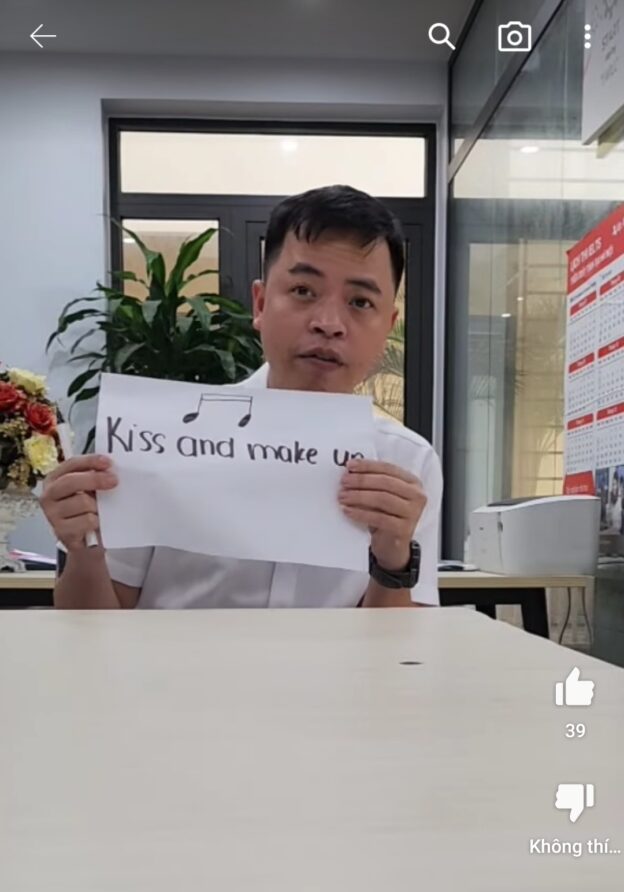
Guess names of some famous songs
Learn english with my daughter: word stress
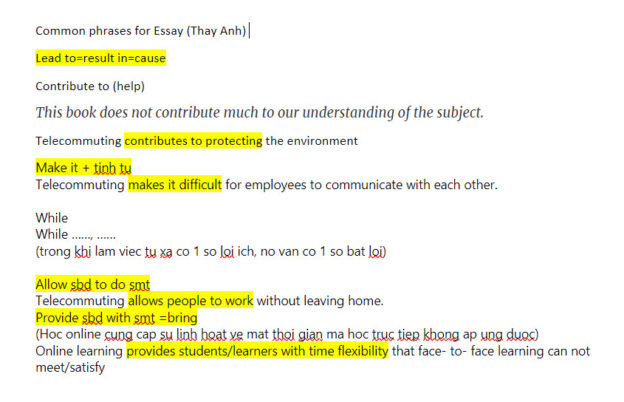
Common phrases for essay (part 1)
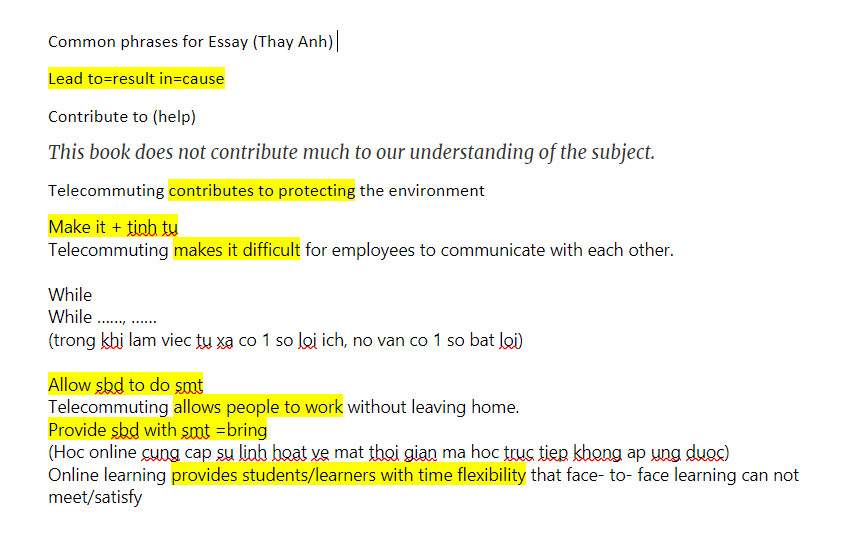

Writing: Các cụm từ thể hiện quan điểm
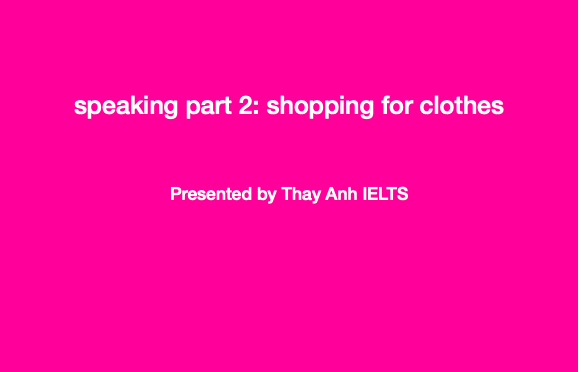
speaking part 2: shopping for clothes
Describe a place where you go shopping for clothes
You should say:
- Where you usually go
- how often you shop for clothes
- how you choose your clothes
- and explain why you go there
Shopping is my hobby. so I often spend my free time doing shopping. I used to buy clothes from various stores, from small ones to shopping malls. But now I am really interested in buying clothes from a store called “ABC” that is about 1 km away from my home.
Since I Knew this store, I often go there twice or three times a month to get my beautiful clothes. You know, I think this store quite satisfies my need because it provides a wide range of clothes, materials, sizes so I can choose outfits that suit me well.
To get suitable clothes, I will choose style first. I am a young person so dynamic clothes will fit me best. Next, I pay attention to material. I love leather most because it makes me more masculine.
Besides, Prices at the store are affordable, only 20-30 dollars. Shop assistants here are very friendly and hospitable. They always help me find the clothes that I very love. I also like the guarantee program of the shop. After bringing clothes home, If I do not like them anymore, in ten days I can bring them back to the store and get full 100% cashback. I think this store is my best choice when buying clothes in my city (Thay Anh IELTS)

DOWNLOAD GET READY FOR IELTS

Thầy Anh giới thiệu bộ sách GET READY FOR IELTS của nhà xuất bản Collins (link tải sách xem bên dưới)
4 cuốn sách trong bộ Get Ready for IELTS đều có một format giống nhau, phân chia theo kiến thức của 4 kỹ năng trong bài thi IELTS là Nghe – Nói – Đọc – Viết. Cụ thể:
- Mỗi cuốn gồm 12 bài học được phân loại kỹ lượng và cẩn thận cho học viên ở trình độ trung cấp có thể dễ học nhất bởi nhiều ví dụ minh họa chi tiết rõ ràng. Kiến thức được cung cấp từ trình độ cơ bản đến nâng cao, giúp người học dần dần quen với IELTS.
- Những phần ngữ pháp và từ vựng quan trọng được cung cấp trong từng bài học. Ở mỗi cuốn bạn sẽ được cung cấp những kiến thức căn bản và bám sát và các kỹ năng giúp bạn ôn luyện các kỹ năng hiệu quả hơn.
- Với mỗi bài học sẽ cung cấp cho bạn những gợi ý, những mẹo làm bài với các dạng đề thi IELTS đã được ra phổ biến trước đó. Cộng thêm là từng phần ở từng bài học sẽ giúp bạn làm sáng tỏ những điểm sai mà bạn có thể gặp phải khi thi IELTS.
- Cuối mỗi bài học đều có bài tập áp dụng để bạn thực hành theo kiến thức đã được cung cấp. Và có những bài test để bạn tự ôn lại toàn bộ kiến thức của các bài học trước đó giúp bạn nắm vững và nhớ lâu hơn.
- Có 4 bài Review cuối sách, đây là những dạng bài tập sẽ giúp bạn kiểm tra lại toàn bộ kiến thức mà bạn được cung cấp ở mỗi cuốn. Nó sẽ giúp bạn nắm lại kiến thức, những kĩ năng cũng như cảm nhận ngôn ngữ cho bài thi IELTS.
- Phần answer keys cuối sách giúp bạn check lại đáp án bài tập ở mỗi phần học.
- Đặc biệt, sách cung cấp vô vàng từ vựng cho từng bài tập sẽ được cung cấp ở cuối sách.
Bạn có thể mua sách ở các nhà sách hoặc đặt mua sách trên mạng để dễ học hơn nhé.
Cuốn sách Get Ready for IELTS thực sự rất hữu ích, Thầy Anh IELTS rất mong nó có thể giúp bạn ôn luyện IELTS một cách dễ dàng và hữu ích để chuẩn bị cho kì thi IELTS sắp tới.
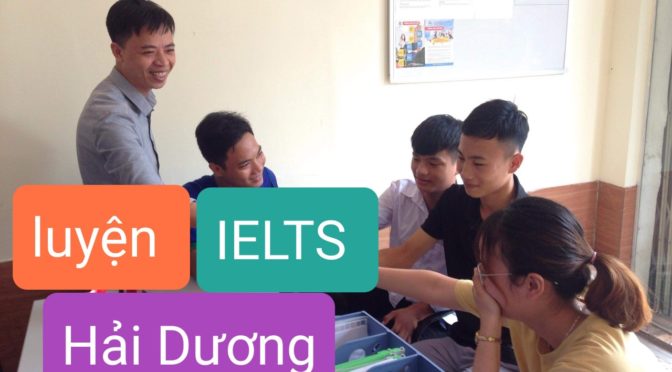
Khai giảng lớp mới tháng 3/2021 – luyện thi ielts ở hải dương
luyện thi ielts ở hải dương
Cam kết đầu ra
Thầy Anh đang chuẩn bị mở lớp
Từ 4.0 lên 5.0
Từ 5.0-6.0
Từ 6.0-7.0+
Các bạn có nhu cầu nhanh tay học nhé-luyện thi IELTS ở hải dương
Thông tin Thầy Anh IELTS ( Nguyên giảng viên Thạc sỹ CĐ DLTM)
– Có nhiều kinh nghiệm luyện thi IELTS và nhiều học viên điểm cao
– Lộ trình học rõ ràng
– Nghiêm khắc với học viên
– Luôn hướng về kết quả cuối cùng: đạt mục tiêu điểm IELTS đề ra
ĐT: 0963.082.184
ĐC học: 36/104, Nguyễn Thị Duệ, Tp Hải Dương
IELTS Speaking Practice: Cooking/Eating Habits

Speaking Part
Q1: Do you enjoy cooking?
Yes, I do. Cooking has always been my passion. I find it therapeutic to prepare meals from scratch, it's like an escape from the hustle and bustle of life. Plus, I get to experiment with different tastes and ingredients, which is quite thrilling for me.
• My passion → Đam mê của tôi
• Prepare meals from scratch → Chuẩn bị bữa ăn từ đầu
• Hustle and bustle of life → Cuộc sống hối hả và ồn ào
Q2: How often do you cook at home?
I cook at home nearly every day. Since I'm a vegetarian, I prefer to prepare my own meals. This way, I can ensure that the ingredients are fresh and the food is cooked according to my dietary needs.
• Nearly every day → Gần như mỗi ngày
• Prepare my own meals → Chuẩn bị bữa ăn của chính tôi
• Dietary needs → Nhu cầu ăn uống
Q3: What type of food do you typically cook?
As a vegetarian, I mostly cook plant-based dishes. I love experimenting with different vegetables and grains to create nutritious and delicious meals. My signature dish is a hearty vegetable stew, which is both satisfying and healthy.
• Plant-based dishes → Những món ăn chay
• Nutritious and delicious meals → Những bữa ăn bổ dưỡng và ngon miệng
• Signature dish → Món ăn đặc trưng
Exercises
- 1. She has a ______ for baking cakes.
- 2. He prefers to ______ his own dinner.
- 3. We live in a world full of the ______.
- 4. I try to eat ______ to stay healthy.
- 5. They cook at home ______ to save money.
- 6. She is preparing a meal ______.
- 7. His ______ is a delicious pasta dish.
- 8. She mostly cooks ______.
- 9. I ensure that my meals meet my ______.
- 10. She finds cooking ______ after a long day at work.
Answers
- 1. Passion
- 2. Prepare
- 3. Hustle and bustle of life
- 4. Nutritious and delicious meals
- 5. Nearly every day
- 6. From scratch
- 7. Signature dish
- 8. Plant-based dishes
- 9. Dietary needs
- 10. Therapeutic
IELTS Speaking Practice: Social Media

Speaking Part
Q1: Do you use social media?
Yes, I do. I am quite a social media enthusiast. I spend a considerable amount of time scrolling through feeds and interacting with friends on various platforms such as Facebook and Instagram.
• Social media enthusiast → Người hâm mộ mạng xã hội
• Scrolling through feeds → Lướt qua các bài đăng
• Interacting with friends → Tương tác với bạn bè
Q2: What do you usually do on social media?
Mostly, I use social media for staying in touch with friends and family, and for keeping up-to-date with the latest news or events. I also occasionally share some of my personal experiences or thoughts.
• Staying in touch → Giữ liên lạc
• Keeping up-to-date → Cập nhật thông tin
• Share personal experiences → Chia sẻ kinh nghiệm cá nhân
Q3: What are the advantages and disadvantages of using social media?
On the positive side, social media platforms provide a convenient way to communicate and share information. However, they can also be time-consuming and distract from more productive activities. Additionally, they have the potential to spread misinformation and can have negative effects on mental health.
• Convenient way → Cách tiện lợi
• Time-consuming → Tốn thời gian
• Spread misinformation → Phổ biến thông tin sai lệch
Exercises
- 1. Social media platforms provide a ______ way to communicate.
- 2. I use social media for ______ in touch with friends.
- 3. I am quite a social media ______.
- 4. They can also be ______ and distract from more productive activities.
- 5. I spend a considerable amount of time ______ through feeds.
- 6. I also occasionally share some of my personal ______.
- 7. They have the potential to spread ______.
- 8. Social media can have negative effects on mental ______.
- 9. I use social media for keeping ______ with the latest news.
- 10. Social media can also ______ from more productive activities.
Answers
- 1. Convenient
- 2. Staying
- 3. Enthusiast
- 4. Time-consuming
- 5. Scrolling
- 6. Experiences
- 7. Misinformation
- 8. Health
- 9. Up-to-date
- 10. Distract
IELTS Speaking Practice: Your Studies/Work

Speaking Part
Q1: What do you do for a living?
I'm currently a data analyst at a tech company. We focus on providing solutions for businesses by manipulating and studying their data, with the aim of improving their performance.
• Do for a living → Kiếm sống
• Providing solutions → Cung cấp giải pháp
• Manipulating and studying → Thao tác và nghiên cứu
Q2: Do you like your job?
Absolutely, I'm genuinely fascinated by the field. I enjoy delving into complex data and finding patterns that can potentially benefit the company. It's like solving a puzzle and it's immensely satisfying when you manage to crack it.
• Genuinely fascinated → Thực sự hấp dẫn
• Delving into → Đào sâu vào
• Immensely satisfying → Vô cùng thỏa mãn
Q3: What do you find most challenging in your work?
The most challenging part of my job is probably when I have to deal with incomplete or inconsistent data. It requires a lot of patience and meticulousness to clean and organize it before we can start analyzing.
• Most challenging → Khó khăn nhất
• Incomplete or inconsistent → Không hoàn chỉnh hoặc không nhất quán
• Meticulousness → Tính tỉ mỉ
Exercises
- 1. I'm _______ a data analyst.
- 2. We focus on _______ solutions for businesses.
- 3. I enjoy _______ into complex data.
- 4. It's _______ satisfying when you manage to crack it.
- 5. The most _______ part of my job is when I have to deal with incomplete data.
- 6. It requires a lot of _______ to clean and organize the data.
- 7. I'm genuinely _______ by the field.
- 8. It's like _______ a puzzle.
- 9. I do this job for a _______.
- 10. The data is often _______ or inconsistent.
Answers
- 1. Currently
- 2. Providing
- 3. Delving
- 4. Immensely
- 5. Challenging
- 6. Meticulousness
- 7. Fascinated
- 8. Solving
- 9. Living
- 10. Incomplete
IELTS Speaking Practice: Future Plans

Speaking Part
Q1: What are your plans for the future?
My future plan is to further my education. I've always had a deep-seated interest in environmental science, and I intend to pursue a master's degree in this field. I believe this will open up an array of exciting opportunities that would otherwise be unavailable.
• Deep-seated interest → Sở thích sâu sắc
• Pursue a master's degree → Theo đuổi bằng thạc sĩ
• Open up an array of → Mở ra một loạt
Q2: Do your future plans involve travelling?
Absolutely, I am quite keen on travelling and exploring new cultures. My future plans definitely involve a fair amount of globetrotting. I particularly aspire to travel to South America, as I've always been fascinated by its rich history and diverse landscapes.
• Keen on → Rất thích
• Involve a fair amount of → Liên quan đến một lượng khá lớn
• Aspire to → Mong muốn, khao khát
Q3: Do you think it is important to have a plan for the future?
Yes, I firmly believe that having a future plan is crucial. It acts as a roadmap guiding us towards our goals. Without a plan, we risk drifting aimlessly and wasting precious time. However, it's also important to be flexible and adaptable, as life is full of unexpected turns.
• Firmly believe → Tin tưởng vững chắc
• Acts as a roadmap → Hoạt động như một bản đồ hướng dẫn
• Drifting aimlessly → Trôi dạt mục đích
Exercises
- 1. I have a deep-______ interest in literature.
- 2. She decided to ______ a degree in psychology.
- 3. The new project will ______ up an array of opportunities.
- 4. He is ______ on playing football.
- 5. My job ______ a fair amount of travelling.
- 6. I ______ to become a successful entrepreneur.
- 7. I ______ believe that honesty is the best policy.
- 8. The map ______ as a roadmap for our journey.
- 9. Without a goal, you risk ______ aimlessly.
- 10. Life is full of ______ turns.
Answers
- 1. Seated
- 2. Pursue
- 3. Open
- 4. Keen
- 5. Involves
- 6. Aspire
- 7. Firmly
- 8. Acts
- 9. Drifting
- 10. Unexpected
IELTS Speaking Practice: Weather & Seasons

Speaking Part
Q1: What’s the weather like in your country?
In my country, the weather varies widely across different regions. In the South, it’s predominantly tropical with high humidity and two basic seasons of wet and dry. However, in the North, we experience a more temperate climate with four distinct seasons, each with its unique charms and challenges.
• Varies widely → Thay đổi rộng rãi
• Predominantly → Chủ yếu
• Distinct seasons → Các mùa rõ rệt
Q2: Do you prefer hot or cold weather?
Personally, I’m more inclined towards cold weather. I find it much more comfortable and convenient for outdoor activities. Moreover, it gives me an excuse to bundle up in cozy sweaters and enjoy hot beverages, which I absolutely love.
• Inclined towards → Có khuynh hướng về
• Bundle up → Mặc nhiều áo để giữ ấm
• Hot beverages → Đồ uống nóng
Q3: How do different seasons affect people’s mood in your country?
I believe that there is a palpable correlation between seasons and people's moods in my country. The summer sun tends to make people feel more energetic and outgoing, while the cold winter months can lead to feelings of lethargy and sometimes even mild depression. The changing colors of autumn often evoke a sense of nostalgia, and the arrival of spring is associated with renewal and optimism.
• Palpable correlation → Mối tương quan rõ ràng
• Evoke a sense of nostalgia → Gợi lên cảm giác hoài niệm
• Associated with renewal and optimism → Liên kết với sự tái sinh và lạc quan
Exercises
- 1. The weather in our city _______ from extremely hot in summer to freezing cold in winter.
- 2. She lives in a _______ Muslim country.
- 3. The four _______ seasons are spring, summer, autumn, and winter.
- 4. I am _______ towards modern architecture.
- 5. It's cold outside, so _______ in your warmest coat.
- 6. I love to drink _______ beverages in winter.
- 7. There is a _______ correlation between smoking and lung cancer.
- 8. Old songs always _______ a sense of nostalgia in me.
- 9. Spring cleaning is _______ with renewal and new beginnings.
- 10. Winter often brings a sense of _______ and calmness.
Answers
- 1. Varies
- 2. Predominantly
- 3. Distinct
- 4. Inclined
- 5. Bundle up
- 6. Hot
- 7. Palpable
- 8. Evoke
- 9. Associated
- 10. Lethargy
IELTS Speaking Practice: Your Family

Speaking Part
Q1: Can you tell me a bit about your family?
My family is a typical nuclear family consisting of my parents, my younger sister and myself. We live in a bustling city, yet we always manage to maintain a peaceful and harmonious atmosphere at home.
• Nuclear family → gia đình hạt nhân
• Bustling city → thành phố náo nhiệt
• Harmonious atmosphere → không khí hòa thuận
Q2: What do you enjoy doing with your family?
We often engage in various activities together, such as cooking, playing board games or watching movies. These shared experiences strengthen our bond and make our family relationship more intimate and enjoyable.
• Engage in → tham gia vào
• Shared experiences → những trải nghiệm chung
• Intimate and enjoyable → thân mật và thú vị
Q3: What role does your family play in your life?
My family plays an indispensable role in my life. They are my constant source of inspiration and motivation. They provide me with love, support, and guidance, which are crucial for my personal and professional growth.
• Indispensable role → vai trò không thể thiếu
• Constant source of inspiration and motivation → nguồn cảm hứng và động lực không ngừng
• Personal and professional growth → sự phát triển cá nhân và chuyên môn
Exercises
- 1. My ______ is very important to me.
- 2. We always ______ in family activities.
- 3. My family provides a ______ atmosphere at home.
- 4. We live in a ______ city.
- 5. My family consists of my parents, my sister and ______.
- 6. We enjoy ______ games together.
- 7. My family is a ______ of motivation for me.
- 8. My family plays an ______ role in my life.
- 9. These ______ experiences bring us closer.
- 10. They provide me with love, ______, and guidance.
Answers
- 1. Family
- 2. Engage
- 3. Harmonious
- 4. Bustling
- 5. Myself
- 6. Playing board
- 7. Source
- 8. Indispensable
- 9. Shared
- 10. Support
IELTS Speaking Practice: Video Games

Speaking Part
Q1: Do you play video games?
Yes, I do. I'm quite a fan of video games. I often play them in my spare time as a way to unwind and de-stress from my busy schedule.
• Quite a fan of → Khá là một fan hâm mộ
• In my spare time → Trong thời gian rảnh rỗi của tôi
• Unwind and de-stress → Thư giãn và giảm căng thẳng
Q2: What type of video games do you prefer?
I'm partial to strategy games. I find them intellectually stimulating and they require a lot of thought and planning, which I enjoy.
• Partial to → Có thiên hướng về
• Intellectually stimulating → Kích thích trí tuệ
• Require a lot of thought and planning → Đòi hỏi nhiều suy nghĩ và kế hoạch
Q3: Do you think playing video games is a waste of time?
Not at all. While it's true that excessive gaming can be detrimental, in moderation, video games can be beneficial. They can improve hand-eye coordination, problem-solving skills, and even foster teamwork and cooperation when playing multiplayer games.
• Excessive gaming → Chơi game quá độ
• Detrimental → Có hại
• Foster teamwork and cooperation → Phát triển tinh thần làm việc nhóm và hợp tác
Exercises
- 1. He is ______ to racing games.
- 2. Playing video games can help to ______.
- 3. Some people believe that ______ can be harmful.
- 4. I often play video games in my ______.
- 5. Strategy games are ______.
- 6. Video games can improve ______.
- 7. I'm ______ of video games.
- 8. They often play video games to ______.
- 9. Multiplayer games can foster ______.
- 10. I find puzzle games ______.
Answers
- 1. partial
- 2. unwind and de-stress
- 3. excessive gaming
- 4. spare time
- 5. intellectually stimulating
- 6. hand-eye coordination, problem-solving skills
- 7. quite a fan
- 8. unwind and de-stress
- 9. teamwork and cooperation
- 10. intellectually stimulating
IELTS Speaking Practice: Your Daily Routine

Speaking Part
Q1: Can you describe your daily routine?
My daily routine is pretty standard. I usually start my day with a quick workout at the crack of dawn. After that, I have a hearty breakfast and then prepare for work. My workday typically revolves around meetings, client calls and deadlines, with occasional coffee breaks in between. In the evening, I unwind by reading a book or watching a movie.
• At the crack of dawn → Vào lúc bình minh
• Revolves around → Tập trung vào
• Unwind → Thư giãn
Q2: Do you follow this routine every day?
Not necessarily. While I try to stick to this routine as much as I can, there are days when things don't go as planned due to unforeseen circumstances. On those days, I simply adapt and adjust my schedule accordingly.
• Stick to → Tuân theo
• Unforeseen circumstances → Những sự cố bất ngờ
• Adapt and adjust → Thích nghi và điều chỉnh
Q3: Would you like to change your routine?
I'm quite content with my current routine. However, I would love to incorporate more outdoor activities like hiking or cycling, if I could squeeze in the time.
• Quite content → Khá hài lòng
• Incorporate → Kết hợp
• Squeeze in → Tìm thời gian
Exercises
- 1. I always ______ my day with a cup of coffee.
- 2. My work ______ around managing my team and meeting clients.
- 3. I like to ______ by listening to music after a long day.
- 4. I find it hard to ______ to a strict diet plan.
- 5. Due to ______, we had to cancel the trip.
- 6. We had to ______ our plans when it started raining.
- 7. I am ______ with my job, but I am considering a career change.
- 8. I try to ______ some exercise into my daily routine.
- 9. I managed to ______ a quick nap in the afternoon.
- 10. The meeting was postponed due to ______.
Answers
- 1. Start
- 2. Revolves
- 3. Unwind
- 4. Stick
- 5. Unforeseen circumstances
- 6. Adapt and adjust
- 7. Quite content
- 8. Incorporate
- 9. Squeeze in
- 10. Unforeseen circumstances
IELTS Speaking Practice: Watching Movies

Speaking Part
Q1: Do you like watching movies?
Absolutely, I am a massive movie buff. There's nothing like losing yourself in a different world for a few hours and getting absorbed in the plot.
• Massive movie buff → Người hâm mộ phim cực kì
• Losing yourself in a different world → Đắm chìm vào một thế giới khác
• Getting absorbed in the plot → Đắm chìm vào cốt truyện
Q2: What kind of movies do you prefer?
I have a penchant for psychological thrillers. They keep me on the edge of my seat and the suspense is always nail-biting.
• Have a penchant for → Có thiện cảm với
• Keep me on the edge of my seat → Khiến tôi hồi hộp, căng thẳng
• The suspense is always nail-biting → Sự hồi hộp luôn cực kì gay cấn
Q3: How often do you go to the cinema?
I try to hit the cinema at least once a month. I believe it's the best way to experience a movie, especially with all the state-of-the-art technology now.
• Hit the cinema → Đi xem phim
• At least once a month → Ít nhất một lần mỗi tháng
• State-of-the-art technology → Công nghệ hiện đại nhất
Exercises
- 1. I have a ______ for romantic comedies.
- 2. The plot was so intriguing. It kept me ______ of my seat.
- 3. She is a ______ movie buff. She can discuss any movie in detail.
- 4. The film was so good, I found myself ______ in it.
- 5. I love watching movies in the cinema because of the ______ technology.
- 6. I usually ______ the cinema once in two weeks.
- 7. I enjoyed the film because of its ______ suspense.
- 8. I prefer to watch movies that transport me to a ______ world.
- 9. The plot was so captivating, I found myself ______ in it.
- 10. I try to watch a new movie ______ once a month.
Answers
- 1. Penchant
- 2. On the edge
- 3. Massive
- 4. Losing myself
- 5. State-of-the-art
- 6. Hit
- 7. Nail-biting
- 8. Different
- 9. Absorbed
- 10. At least
IELTS Speaking Practice: Smartphones

Speaking Part
Q1: Do you own a smartphone?
Yes, I do. I own an iPhone which I've had for a couple of years now. It's an integral part of my daily life, from organizing my schedule to staying connected with friends and family.
• Own → Sở hữu
• Integral part → Một phần không thể thiếu
• Staying connected → Duy trì liên lạc
Q2: What do you use your smartphone for the most?
I primarily use my smartphone for communication and information. I stay in touch with my friends and family through various social networking apps and I surf the Internet for news updates or academic research.
• Primarily → Chủ yếu
• Social networking apps → Ứng dụng mạng xã hội
• Surf the Internet → Lướt web
Q3: Can you live without your smartphone?
Honestly, it would be quite challenging. My smartphone is not only a communication tool but also an essential device for my work and studies. It's almost like a portable office that I carry around.
• Challenging → Thách thức
• Essential device→ Thiết bị quan trọng
• Portable office → Văn phòng di động
Exercises
- 1. Do you ______ a smartphone?
- 2. My smartphone is an ______ part of my daily life.
- 3. I primarily use my smartphone for ______ and information.
- 4. I stay in touch with my friends through various ______ networking apps.
- 5. I ______ the Internet for news updates.
- 6. Can you ______ without your smartphone?
- 7. It would be quite ______ to live without my smartphone.
- 8. My smartphone is an ______ device for my work.
- 9. My smartphone is like a ______ office that I carry around.
- 10. I use my smartphone to stay ______ with friends and family.
Answers
- 1. Own
- 2. Integral
- 3. Communication
- 4. Social
- 5. Surf
- 6. Live
- 7. Challenging
- 8. Essential
- 9. Portable
- 10. Connected